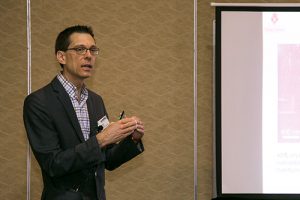At AiMES 2018, Michael Arnold was presented with the ECS Charles W. Tobias Young Investigator Award for his work “Overcoming the Materials Science Challenges to Nanocarbon Electronics.” The award recognizes outstanding scientific or engineering work in fundamental or applied electrochemistry or solid state science and technology.
“It’s certainly fantastic recognition,” says Arnold, “not only just of my efforts but my students’ efforts. I mean, the students are the ones in my group doing the work, so it makes me proud to receive the reward, but it’s really pride in my group.”
Arnold, a professor in the Materials Science and Engineering Department at the University of Wisconsin-Madison, work addresses fundamental challenges—in controlling the growth, processing, ordering, and heterogeneity of nanomaterials and in understanding phenomena beyond the scale of single nanostructures—that must be overcome to exploit nanomaterials in technology.
He says his focus is on two applications—first, to make new semiconductors that are better than silicon to make computer chips faster and use less power, so the battery lasts longer, and second, to create biosensors that can measure concentrations of proteins in blood by using a semiconductor.
“I’m trying to make new semiconductors from carbon that could improve all of those applications,” says Arnold.
His research has resulted in 100 journal publications and 15 patents/patent applications.
Arnold is a longtime member of ECS, first joining during his time as an assistant professor at the University of Wisconsin.
“The nanocarbon division is one of the best of any society in the world. I would say with the best group of people studying nanocarbon materials. It is the best of the best,” says Arnold of what drew him to ECS.
Arnold has been a recipient of the ECS Nanocarbons SES Research Young Investigator Award (2018); the National Science Foundation CAREER award (2014); the American Chemical Society Arthur K. Doolittle Award in Polymeric Materials Science and Engineering (2012); the Presidential Early Career Award for Scientists and Engineers (PECASE) – nominated by the U.S. Department of Defense, Army Research Office (2011); the U.S. Department of Energy (DOE) Early Career Research Award (2011); and a 3M Non-Tenured Faculty Award (2011, 2012, 2013). He was also a runner-up in the U.S. Department of State ASPIRE Competition (2017).
Learn more about ECS’s 13 electrochemistry and solid state science and technology divisions and topical interest areas here.


